Elon Musk offers to buy Twitter for $41.39bn as he says takeover needed to uphold free speech
Billionaire Elon Musk has offered to buy Twitter for $41.39bn, saying his proposed takeover is needed to uphold free speech.
The Tesla chief executive offered to pay $54.20 a share a little more than a week after his 9.2% stake in the company was publicly announced.
“I invested in Twitter as I believe in its potential to be the platform for free speech around the globe, and I believe free speech is a societal imperative for a functioning democracy,” he said in a letter to Twitter chairman Bret Taylor.
Read more: Elon Musk’s swoop on Twitter likely to succeed but its employees will be nervous
“Since making my investment I now realise the company will neither thrive nor serve this societal imperative in its current form.
“Twitter needs to be transformed as a private company.”
‘This is not a threat’
He pointed out that his offer was 38% higher than the price of Twitter’s stock the day before it was revealed that he had become the company’s largest shareholder.
“My offer is my best and final offer and if it is not accepted, I would need to reconsider my position as a shareholder,” he added.
He said “this is not a threat, it’s simply not a good investment without the changes that need to be made”.
He said he does not have “confidence in management” and does not believe he can “drive the necessary change” while the company is still public.
Following the announcement, Twitter shares jumped 12% in premarket trading after closing at $45.85 a share on Wednesday.
Twitter confirmed it received the “unsolicited” proposal and said its board will “carefully review” it to “determine the course of action” that it believes is in the best interest of the company and its shareholders.
It comes just days after the billionaire rejected a seat on the social media company’s board, which would have stopped him from taking over the company.
Musk is a frequent user of Twitter and has more than 80m followers, but this is not the first time he has been critical of the platform’s approach to free speech.
Neil Campling, from Mirabaud Equity Research, called his proposal a “hostile takeover” which is going to cost “a serious amount of cash”, adding that Musk may have to sell Tesla stock to fund it – or take out a massive loan.
Musk is currently worth about $265bn, according to Forbes.


